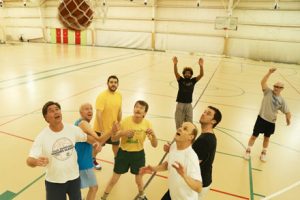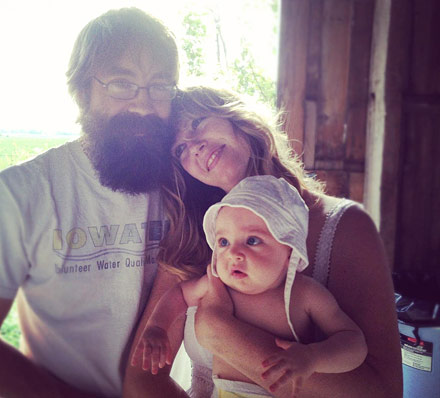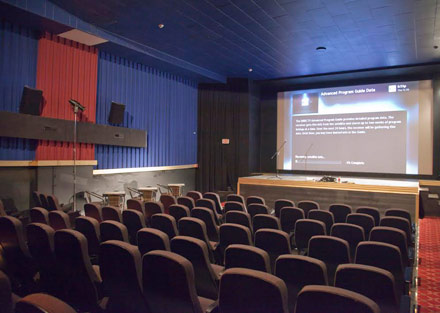
What would it be like to live in a place where your social status wasn’t based on your dollar worth? Is that even possible in our thing-obsessed society? Well, after more than a year in Fairfield, Iowa, I’ve gotten some perspective on the matter.
In Los Angeles, where I’d spent a decade, the material life mattered so much it blotted out just about everything else, including, too often, civility. I remember the night I learned just how much one’s car mattered. I had asked out a woman I knew and all was going great — right up until I mentioned I’d be picking her up in a Camry. Then, dead silence on the line. When she’d recovered she said, “I’m sorry, this just isn’t going to work.” When I recovered, I realized what I was in for in the City of Angels.
A few years later I was working at a high-tech company in Boulder, Colorado, a former counterculture mecca which had morphed into a kind of shiny, happy suburb. Laid back, owner-operated cafes had given way to high-end bike shops and ultra-posh restaurants, and the lesser classes were being squeezed out. I recall occasionally extending a hand of friendship to one of the town’s elites, usually encountering a polite, “No thank you very much, I like my life exactly the way it is.” Okay, they didn’t actually say it. Still.
In Fairfield, it’s not the size of your wallet that counts but your spiritual chops. It’s your creativity, authenticity, your be-here-now-ness. It’s your ability to understand at a deep level that this is basically all there is that gets you noticed, whatever your economic status may be. If money talks out there, then joie de vivre speaks in here.
Recently I was playing basketball at a local gym with a guy who’s the CEO of a big multinational company — along with guys from the other side of the tracks, some who have virtually nothing, who live in trailers or crumbling homes on a small social security check. The power forward I was up against, 62 and built like a cement pillar, was ensconced in the sadhu life, meditating daily and living in near poverty yet finding bliss in ways that make you want to rethink life’s big questions.
In the larger cities I’d lived in, the wealthy tended to shun people outside of their class, and often for good reason, I discovered when I had worked for a spell alongside Hollywood celebrities. Most everyone wanted something from them. They were seen as a ticket — funding. No wonder they kept their circles pulled in tight. Contrast that to Fairfield, where once, at a local dance, I put out the word I liked baseball and up came a friendly oil magnate overjoyed to set up a catch.
Now, I’m not saying community-oriented wealthy people aren’t everywhere, it’s just that here it kind of hits you over the head. No doubt that’s due in part to the arrival of the Transcendental Meditation community — about a quarter of the town — who moved here back in the 1970s.

In Fairfield, class lines are drawn differently. A have may be a person who possesses precious little materially yet still may be held in high regard. Witness all the musicians, school teachers, house painters, and anti-strivers in Fairfield with full calendars. At the potluck parties that pepper the summer months, haves and have-nots look and act just about the same. These atypicals can especially surprise you when it comes to transacting commerce. Last year, a newlywed couple invited the whole town to a $25-a-plate fundraiser dinner to raise money toward buying their first house. Their folk-rock band put on a knockout show, supercharged by real love and community, and they netted half the down payment.
Here, many of the wealthy are the wealthy-aware — folks whose philosophy often runs deeper than scheming ways to acquire more of the green bills. They are entrepreneurs, creatives, seekers and businesspeople; and even, yes, the born rich, many of whom don’t seem to be enmeshed in their own greatness. This being planet Earth, no city or town can ever be a utopia. But Fairfield does boast Utopia Park, a feisty mobile home development.

In a town too small to offer much in the way of material distraction, one must look elsewhere for stimulation. In doing so you find it really is the little things that count. Around here, one can barely find a place to buy a pair of jeans, much less big-city brands to separate you from the pack. Nor, unlike most places I’ve been, is there much desire for that. Iowa seems classless, democratic, a reality apart, where the gulf between haves and have-nots is more like an aisle.
Sometimes the blending of peoples here is palpable, like the other night when I drove through a snowstorm to get to the Orpheum, Fairfield’s movie theater.
I wasn’t crazy about the film that was showing. But nightlife being what it is in these parts, I took a seat, grateful to be in our little movie house, happy to escape into an imagined world for a spell, satisfied to be among my fellows — young, old, rich, poor, smoker, nonsmoker, sustainable, unsustainable, whatever they choose to be (and there’s no hiding it here). They too were probably grateful for the same things, content to be in the warm (well, the upper seats anyway) darkened room, cocooned within that unspoken small-town sense of community.
Those sweet moments can still arise in a few hamlets that the coastal elites consider too minor or unremarkable or out of the way to be noteworthy, but which can offer precious rewards to those willing to slow down and look below the surface.
Read AWOL in Iowa, Exasperated Urbanite Finds the Sweet Life
Contact writer:
info@warrengoldie.com
www.WarrenGoldie.com
